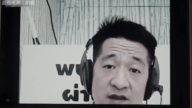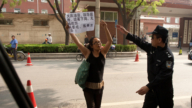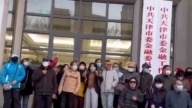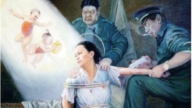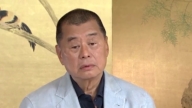【新唐人2012年12月29日讯】一封来自中国劳教所的求救信,被发现在美国的万圣节礼品里面。这一事件被曝光后,美国政府和产品出售公司迅速介入调查,同时,也引发了海外媒体的普遍关注。
据《美国之音》报导,中国沈阳“马三家劳教所”接受采访时,反复强调信中描述的不可能。正如杀人者不会承认自己是凶手一样,马三家的否认丝毫不让人意外,但是,他们否认不了数万法轮功学员的亲身经历,否认不了无数曾在大陆监狱、劳教所里被奴役、酷刑的人们现身说法。
大陆维权律师唐荆陵指出,在中国,不单单只是在劳教所里面存在奴役劳动,在监狱、看守所里面同样如此。
大陆维权律师唐荆陵:“他们的这种奴役劳动,有的甚至是外包给工厂去做了,有的管理更糟糕的监狱,直接把这些人(犯人)外包给其他的人去做事。比如把这个工厂外包给一些所谓的私营企业老板,当然这个老板可能跟监狱的官员有关系,就是有经济利益上的直接关联。”
曾在湖北省“汉阳监狱”被关押了22年之久的周先生,向《新唐人》讲述了他在监狱做奴工的遭遇。
周先生:“我们在里面就是做苦力,比如说,我是监狱的干警,我和外面的老板结识了以后,外面的老板就把产品送到汉阳监狱里去,让犯人做,我们那没有节假日的,每天做12个小时,我们只有一点点低工资,如果你是出全勤的话,可能是50元钱吧,一个月。”
他们做的产品主要以电子产品、衣服和毛织产品为主,尤其是毛织产品。但很多犯人得了肺结核,甚至有些年轻人在里面得了肺结核吐血。有的抢救过来,没有抢救过来的,就说正常死亡。
某李姓私营企业主证实,嘉陵有一个配件厂,里头都是些犯人。在狱中,如果犯人拒绝制作奴工产品,多数会受到酷刑折磨。
周先生:“(不做)那就是关禁闭、重管,体罚。要嘛做老虎凳、要嘛吊起来、要嘛板子镣,随你选哪一样。那里面的刑具、刑罚残酷的很。”
唐荆陵表示,这个经历很难有例外,不论被刑事拘留几天,或者被劳教半年或几个月的人,都有这样的经历,只有极少数经过激烈抗争的人,通过生命抗争的人,能例外。
唐荆陵:“我们接触到法轮功修炼者的案件,还有一些政治异议人士的案件,或者说一些维权者的案件,他们有的能够幸免。但是这个幸免的代价是很昂贵的。就是他可能要通过绝食,几十天,甚至有的时候是撞墙,很激烈的拚命式的这种抗争才能换来他不去从事这个奴役劳动。”
相比刑事犯和政治犯,法轮功学员是整个监狱里遭遇最悲惨的。
周先生:“我们的生产劳动任务各个方面、待遇比法轮功要略微好一点点,最残酷的就是法轮功。他们没有什么时间的。法轮功他们做事情,有规定的任务,定的十个小时,做不完,加班!有的做到晚上一两点,他都做不完,做不完接着做。他是属于强制劳动的。你不做完,那就是挨打的,不做完是不行的。”
为了掩盖这些见不得光的黑幕,大陆监狱一方面全力封锁消息,一方面对外表现出一副法制化、人性化管理的假象。
周先生:“那里面没有人性可言,监狱跟外面是封锁一切消息的。在那里面冤死的人太多了,消息是带不出来的。外面的记者进去、上级领导来参观,他就把老弱病残全部都锁起来,外面参观的人一看,外面漂亮的很,内部的东西肮脏的很,不知道内情的人,根本就不知道。”
这也就不难解释为什么外媒记者总是无功而返了﹗中共又怎么会承认他们犯下的滔天罪行﹖
采访/易如 编辑/张天宇 后制/钟元
To Prove SOS Letter, Mainland Chinese People Expose Dark Side of Slave Labor
A letter calling for help from a Chinese labor
camp was found in Halloween gift in USA.
After it was exposed, the USA government and gift
marketing company immediately investigated it.
At the same time, it also attracted
international media attention.
Voice of America reported that when Masanjia
labor camp was interviewed about the letter,
they repeatedly emphasized it was impossible.
Just as someone will not admit that he is a murderer,
it isn’t unusual that Masanjia labor camp denied the letter.
However, they can’t deny evidence from
the first-hand experiences of several tens of thousands of Falun Gong practitioners.
They can’t negate the stories of those who
were tortured, or experienced forced slave labor
in Mainland Chinese prisons and labor camps.
Mainland civil rights attorney Tang Jingling points out
that in Mainland China, slaves exist not only in labor
camps, but also in prisons and detention centers.
Tang Jingling: “The labor camps even outsourced
their imprisoned slaves to other factories.
For example, they outsourced their slaves to
factories owned by so-called private bosses.
Of course, the bosses have some interests
of connections with the prison officials.
Mr. Zhou was detained for 22 years
in Hanyang prison in Hubei province.
Zhou told NTDTV his experiences
of slave labour in prison.
Mr. Zhou: “In prison, we only engaged in heavy labor.
For example, if I’m a prison policeman, I know some [factory]
bosses, and these bosses would take their products
into Hanyan prison, and force the prisoners to make them.
We have no holidays and we work 12 hours
per day. We only get very little wage.
If you are full time, you can get 50 RMB per month.”
Mr. Zhou said they mainly produced
electronic products, clothes and woolen knitwear.
Many inmates got tuberculosis and even some younger
inmates contracted tuberculosis and vomiting blood.
Some were saved and some not, the
prison would say they died normally.
One private boss surnamed Li, confirmed
that there is a parts factory in Jialing district,
where the workers in the factory are all inmates.
In prison, if the inmates refused to make slave
labor products, most of them would be tortured.
Mr. Zhou: “If you refused to do the work,
you would be detained and tortured.
In prison, the torture instruments
and the penalties are very cruel.”
Tang Jingling said that in prison,
there are few exceptions for inmates.
Whether they were detained for a long or short
period of time, they had such an experience.
There are only a few exceptions
fighting with their own lives.
Tang Jingling: “I have witnessed some Falun Gong
practitioners and other righteous persons or human
rights defenders, some of them can be exceptions.
However, there is a high price for being an exception.
Maybe they would go on a hunger strike for tens of days.
Sometimes they could avoid the slave
labor through hitting their head on a wall.
After all of this, they may be able to avoid slave labor.
Mr. Zhou told the reporter that compared to criminals
and political prisoners, the circumstances
of Falun Gong practitioners is the most tragic.
Mr. Zhou: “We are a bit more fortunate than
Falun Gong practitioners in terms of workload.
Falun Gong practitioners are treated
very badly, they have no spare time.
The jobs assigned to them take ten hours, and if
they can’t finish, they are forced to work overtime.
Sometimes they would not finish until 1 or 2 O’clock
in the morning, and they must continue to work.
They belonged to forced labor. If they couldn’t finish
the police would beat them, so they must finish it.”
To cover up this dark side, the prisons in the
Mainland make efforts to block the message.
They also create false legalization
and fake humane management.
Mr. Zhou: “There is no humanity in prisons.
The prisons blocked all the information.
There are too many aggrieved dead people
in prisons, and the messages can’t be sent out.
When outside reporters and diplomats investigate
this, the prison will lock away the old and sick people.
Observers saw a beautiful prison, but inside
it was very dirty and outsiders can’t see this.”
This explains that overseas media journalists
cannot find the truth inside Mainland prisons.
How can the Chinese Communist Party
(CCP) admit their heinous crimes?





